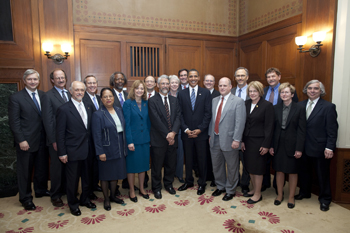|
|
|
|
|
|
|
News & Views item - August 2009 |
![]() Report on US President's Council of Advisors on Science and Technology Inaugural
Meeting.
(August 12, 2009)
Report on US President's Council of Advisors on Science and Technology Inaugural
Meeting.
(August 12, 2009)
All in all an interesting contrast to PMSEIC.
 The
President's twenty-one strong Council of Advisors on Science and Technology
(PCAST)
met publicly first the first time last week, although they had
already issued their first report, on the government's H1N1 pandemic strategy.
The report had been commissioned by President Obama in late June. Shortly
after, the council met for two days with around a dozen experts in public
health, virology and other key fields. According to NatureNews: "The
report, which has not yet been made public, was delivered two weeks later and
addressed the value of scenario planning, communicating complex messages to the
public and policy-makers, and the types of legal, social, financial and other
factors that could get in the way of responding to a pandemic.
The
President's twenty-one strong Council of Advisors on Science and Technology
(PCAST)
met publicly first the first time last week, although they had
already issued their first report, on the government's H1N1 pandemic strategy.
The report had been commissioned by President Obama in late June. Shortly
after, the council met for two days with around a dozen experts in public
health, virology and other key fields. According to NatureNews: "The
report, which has not yet been made public, was delivered two weeks later and
addressed the value of scenario planning, communicating complex messages to the
public and policy-makers, and the types of legal, social, financial and other
factors that could get in the way of responding to a pandemic.
PCAST Co-Chair Eric Lander said: "Everyone felt that it was probably the best response ever to an epidemic event."
President Obama's Chief Scientific Advisor and PCAST Co-Chair, John Holdren, opened the August 6 meeting saying it brought together: "a spectacular cast of leaders of our science, technology and innovation communities."
Professor Holdren's immediate predecessor (chief scientific advisor to President George W. Bush) John Marburger agreed that the new council "has a great membership and outstanding co-chairs," however, he added, perhaps ruefully, "but its ability to influence events depends on who listens."
Professor Marburger prior to the formation of the new council also advised that it should limit the number of members (PCAST under President Bush expanded from 24 to 35, tended to focused more on technologial advice, and included fewer academic scientists and more business executives).
In NatureNews' view: "PCAST's success or failure depends mainly on its access to the president and on its interactions with various other advisory groups within the administration. These include the Office of Science & Technology Policy, which Holdren directs, and the National Science and Technology Council, composed mainly of the heads of agencies that deal with scientific matters, along with the US vice-president."
In Professor Holdren's view the timely formation of PCAST indicates that President Obama thinks that science and technology are crucial in addressing global challenges -- and as scheduled -- on 7 August, the council met with the US president for a little over an hour.
Finally, some of the matters raised by the council's members that might be examined are the research agenda for the proposed but yet to be funded National Institute for Food and Agriculture, governmental approaches to cancer research, which would include are the most creative approaches getting support in their early days and US research to cope with the effects of climate change.
The next scheduled PCAST meeting is in late October, i.e. less that three months away.
______________________________
[Note added August 13, 2009]
PCAST has created six subcommittees to manage the portfolio of topics it plans to address.
The subcommittees include:
STEM Education,
Innovation and Technology,
Economic Development,
International Security,
Energy and Environment, and
Interdisciplinary Aspects of S&T.
Among the topics that the subcommittees plan to tackle are:
science standards;
advanced manufacturing for emerging technologies;
private-sector R&D investments;
orbital space debris;
carbon offsets; and
interdisciplinary agriculture research.